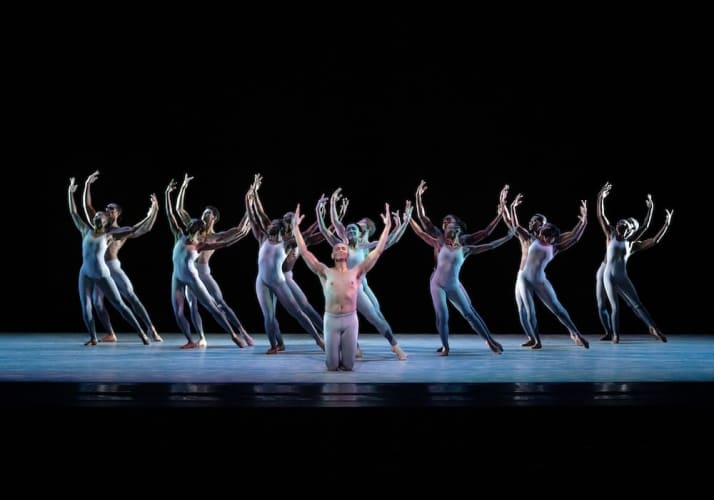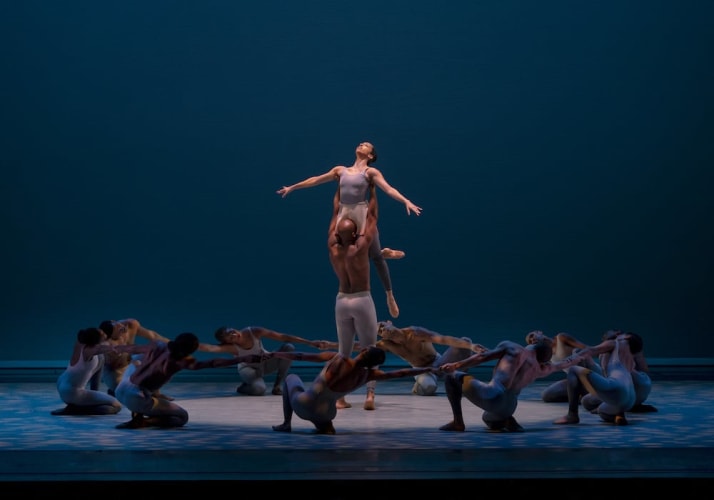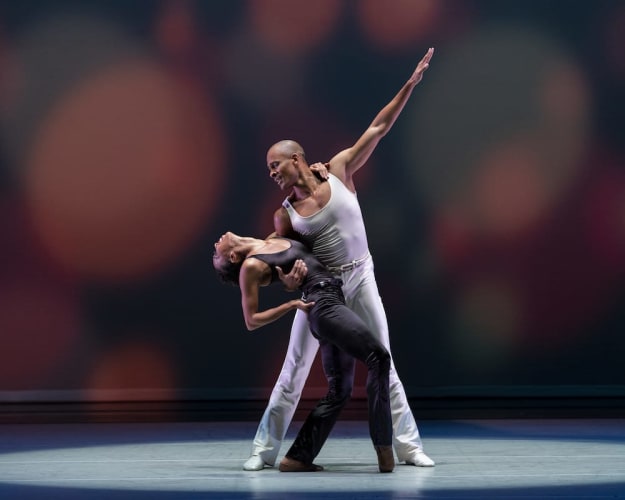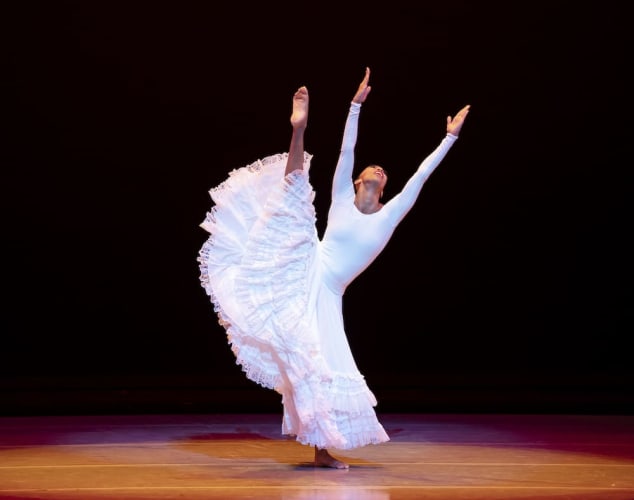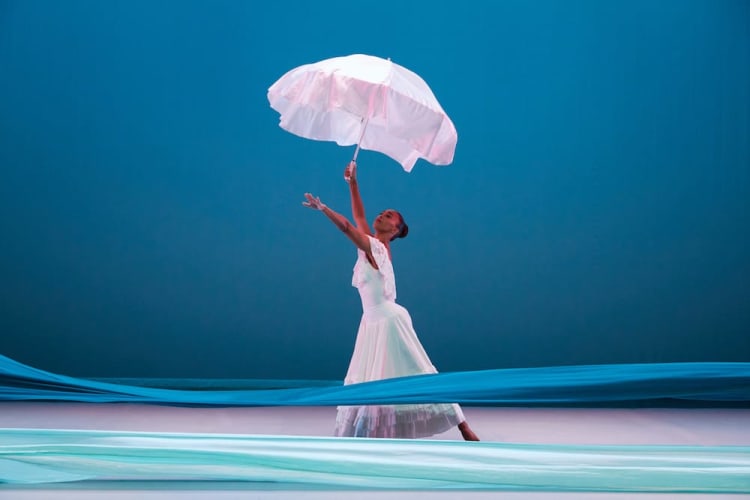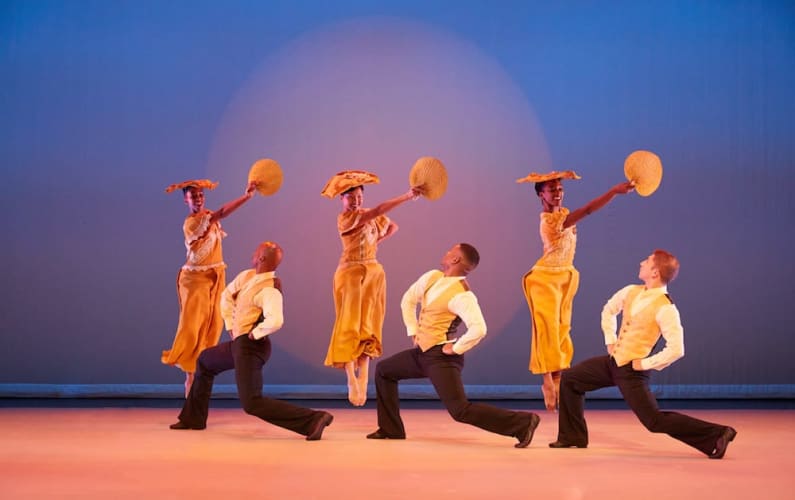A treat to see not only Alvin Ailey’s signature standard, Revelations, but three of his pieces from the seventies when modern dance was coming into its own. Martha Graham and Katherine Dunham were strong influences, but also mentor Lester Horton with his ethnic dance and ‘whole body’ technique.
Whole body is the right description for the Ailey dancers, who seem to be indefatigable in their engagement with the dance, the music and us. Having said indefatigable, there are some cast changes, but these don't rock the boat at all, the overall standard is so high.
Duke Ellington is the big draw tonight. His “first symphonic score written for dance”, with Ailey and Ellington collaborating “closely”, is epic, mythological even. The River of 1970 courses through Spring, Meander, Giggling Rapids, Lake, Falls, Vortex, Riba and Twin Cities.
Spring reminds me of a jazzy (with oriental tinge) Rite of Spring, naiads all, male and female. The light changes (Chenault Spence), moods shift. A couple, the leaders of the tribe perhaps, is encircled by the troupe. A trio Meanders off, a couple ‘giggles’ in the rapids. Another couple lingers in the Lake. You get the picture.
The titles spell out the sound and the movement. Eight pieces but it’s really one big flow. Full company, trios and duets, and a tightly spinning Vortex solo (Deidre Rogan): classical ballet (trios of cygnets…) meets modern jazz and Hollywood. I think of Gene Kelly in ballet phase and Cyd Charisse. Jazz hands, cool cats, dangerous allegro, amazing shoulder lifts—the final sombre duet is almost baroque.
Cool and sexy is the only way to describe Pas de Duke. Balanchine also spring to mind. Originally created in 1976 for Judith Jamison (now artistic director emerita of the company) and Mikhail Baryshnikov, it has plenty of his cheeky sass and her strength.
Ellington’s music—“Such Sweet Thunder”, “Sonnet for Caesar”, “Sonnet for Hank Cinque”, all from 1957, with “Clothed Woman” from 1948 and “Old Man’s Blues” from 1930—is a Broadway cabaret show, giving life to five stylish solos and fleeting flirtatious duets, with personality to spare.
Imagine having to follow in Baryshnikov’s inimitable footsteps—I don't envy the dancer. This special creation was so soon after Baryshnikov’s defection, when he was exuberantly trying everything the West could offer. Personalities and techniques shone through: Jamison’s commanding modern dance style and Baryshnikov’s superlative classical technique, which he made look so easy.
Each dancer has to bring something of themselves to it. A supremely confident Jacquelin Harris outdoes Patrick Coker, but then she’s meant to. He in white (denoting innocence or rock star status), she in bronze trouser suit, signifying no messing with me: both play to the audience, she particularly. We get the message: men don't stand a chance when there’s a woman about.
Cry (1971) was Ailey’s birthday present for his mother, creating the 16-minute solo on his muse, Jamison. Mother of two and the oldest in the company (not that you’d know), Constance Stamatiou explains in the programme notes what it means to be a black woman and a mother in America, the strength and fortitude required, the fighting spirit.
It's a specific and a universal theme. Women do get weary... In white dress she might have stepped out of Revelations, that paean to the African American experience. It carries quite a punch because it is personal. Again, each dancer will bring her ‘personal’ to it.
Stamatiou, statuesque, proud, suffers eloquently, screams silently, scrubs the floor with her multipurpose long white scarf, ties her head in it, wraps it around her shoulders for comfort. She gets a curtain call bouquet of red flowers for her efforts.
In three chapters, in Graham style, the woman has to overcome hardship and life’s travails, and she does but it takes its toll. It's “a journey of bitter sorrow, brutal hardship and ecstatic joy”, though Jamison said Ailey never explained to her what it was about. Ailey dedicated this piece to “all Black women everywhere—especially our mothers.”
It ends in exultation, a perfect prelude to Revelations, in which Christopher R Wilson shines, particularly in Sinner Man. Vernard J Gilmore flawlessly performs my favourite number, “I Wanna Be Ready”, and Ashley Kaylynn Green again stands out.
